This is a listing of the most commonly ordered supplies. If you are not sure if you need a particular supply or how it is used, please consult us. If there is something you need that is not on this list, please ask to see if we have it.
Flushes
All lines and ports must be flushed at regular intervals. Review the How-To-Guide for more information.
|
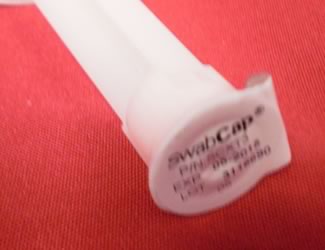
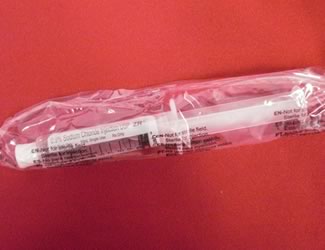
|
- Saline Flush kit – each kit contains two saline flushes (5 kits = 10 flushes.) One of these has a swabcap on the end.
- Saline Flush – Excelsior, sold individually.
- Heparin Flush – sold individually.
|
Connectors & Extensions
|
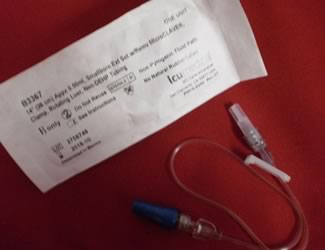
|
- 14” extension with Microcalve connector – used most commonly with PICC lines.
- 7” extension with Microclave connector – used most commonly for peripheral IVs or tunneled catheters such as a Hickman.
|
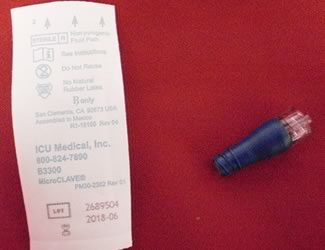
|
- Microclave needleless connector – most commonly used with Huber needles, when an extension is not needed.
|
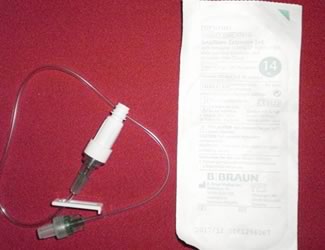
|
- The above size/type connectors are available with an Ultrasite connector (instead of Microclave.) These are slightly more expensive.
|
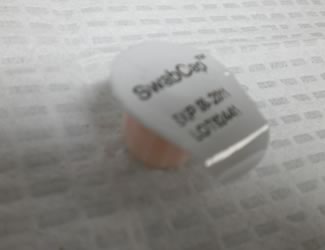
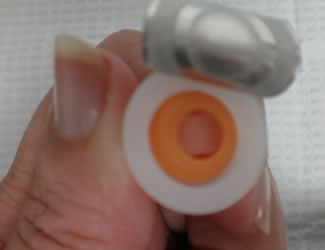
|
- Swabcaps – are placed on the end of your connector. It is a cap that has an alcohol sponge on the inside, so continually bathes the connector to disinfect it. They are available by themselves, or on the end of the saline flushes. Review the
How-To-Guide for more information.
|
IV Tubing
This is needed when your medication comes in regular IV bags that are infused by gravity. Review the How-To-Guide for more information.
|
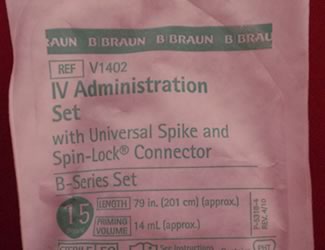
|
- IV tubing without a filter – to be used when medication comes pre-mixed, or you are infusing just fluids.
|

|
- IV tubing WITH a filter – to be used if you are mixing medication.
|
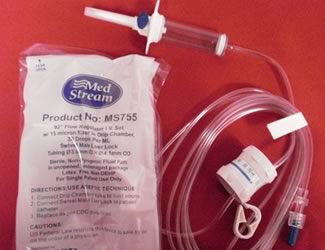
|
- Dial-a-Flow tubing – used to facilitate regulating a drip rate. This tubing does not have a filter. If you need a filter, it may be added on.
|
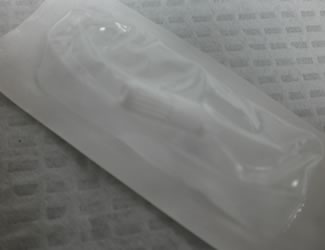
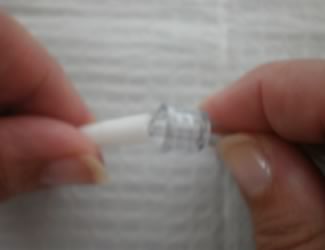
|
- Distal caps – You can use one IV tubing for 24hrs if you are not infusing different medications, however you must keep the end of the tubing sterile. These caps allow you to do this. Review the How-To-Guide for more information.
|
Syringes and Needles
|
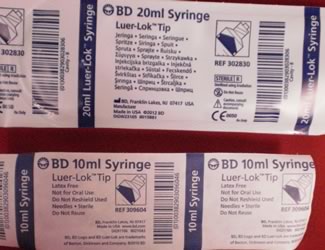
|
- Syringes – are available in various sizes. Some may come with a needle attached and some do not come with a needle. Please consult our staff to determine the appropriate size syringe for your needs.
|
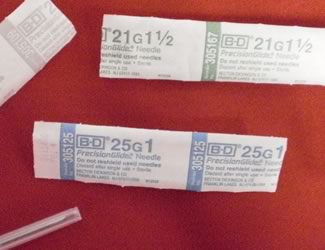
|
- Needles – also are available in various sizes. It is important that you know what you will be doing to determine the size you need. For example, you should know if your injections are subcutaneous (SQ) or intramuscular (IM). We can help you determine the size of the needle you need. These are some general guidelines.
-
- The smaller the gauge (thickness) of the needle, the bigger the number.
- For an IM injection, needles should be a minimum of 1” long if given in a small muscle such as deltoid (upper arm) and 1 ½” long if given in a larger muscle such as the hip or thigh.
- A SQ injections requires a shorter needle ( ½ – ¾”) long. The gauge (thickness) of the needle can be a little thinner than for an IM.
- If you are using needles to add or mix medication, the gauge of the needle should be thicker (generally 18gauge.)
|
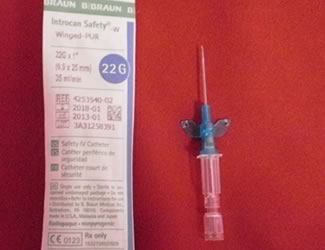
|
- Angiocaths – This devise is used to start a peripheral IV that will be left in for a few days. It is comprised of a thin, plastic catheter, with a metal needle inside. Once in the vein, the inner metal is removed and the plastic catheter is left in place. Note that peripheral IVs do not stay in place for longer than a few days. They infiltrate easily and sometimes need to be removed after one or two uses.
|
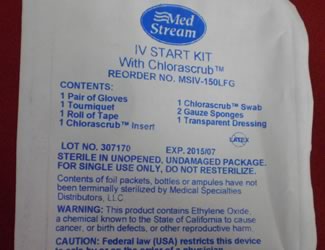
|
- IV Start Kits – If you are having peripheral IVs with angiocaths, you will need an IV Start Kit for the supplies needed to start your IV. This includes a tourniquet, alcohol pads, transparent dressing, tape, etc.
|
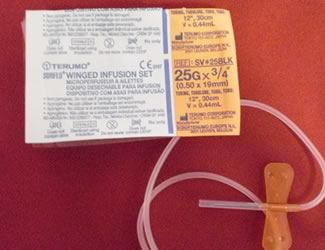
|
- Butterfly Needles – these come in a few different sizes and are generally used for blood draws or intermittent infusions that do not require the needle to be left in the vein.
|
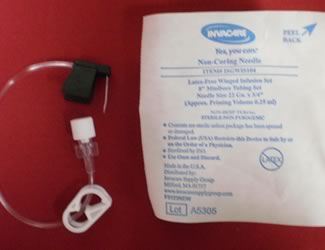
|
- Huber Needles – these are right angled needles that are used to access a port. They come in various sizes. These needles have extension tubing attached, but not a connector – the connector must be added.
|
Central Line Dressing Kits
Dressings covering a central line or port must be changed at least every 7 days (or every 2 days if there is any gauze under the dressing.) We offer three types if kits for this purpose, which include all the supplies needed. Generally the supplies in the kits are also available on an individual basis should you need more. Review the How-To-Guide for use directions.
|
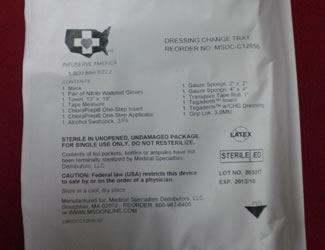
|
- Custom Kit – Includes Chloraprep antiseptic, a Griplock and a Tegaderm CHG.
|
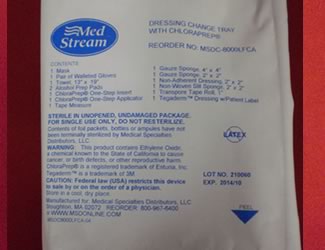
|
- Basic Dressing Change Kit – same as the Custom Kit but omits the Griplock and has a plain Tegaderm instead of CHG Tegaderm.
|
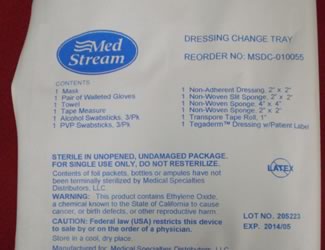
|
- Betadine Dressing Change Kit – same as the Custom Kit, but replaces Chloraprep with Betadine, has a plain Tegaderm instead of CHG Tegaderm and omits the Griplock.
|
Other Products for Central Lines
|
Securement Devices
It is recommended that PICC lines be secured. We carry two devices specifically for this purpose.
|
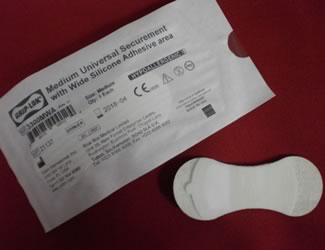
|
|
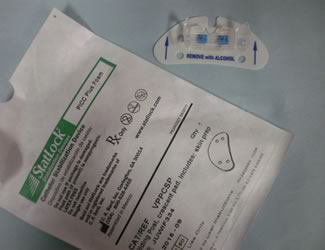
|
|
Antimicrobial discs
It is recommended that some type of antimicrobial be placed around your insertion site. This may simply be the Tegaderm that has the CHG patch. These are other options.
|
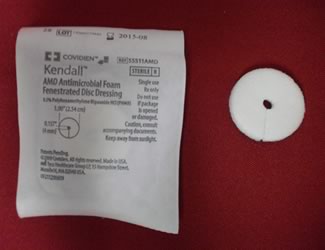
|
|
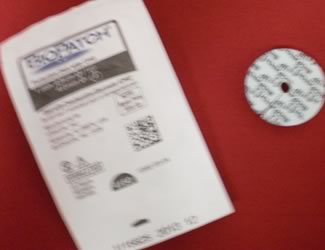
|
|
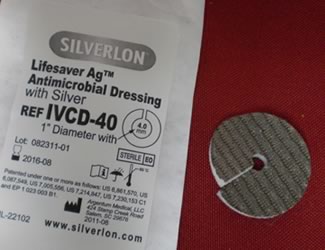
|
|
Transparent Dressings
If you are sensitive to the dressing that comes in your Dressing Change Kit, we have other options. Call us to discuss the best course of action.
|
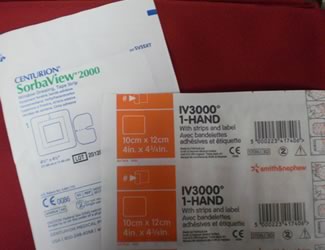
|
- Reliamed
- IV 3000
- Sorbaview
|
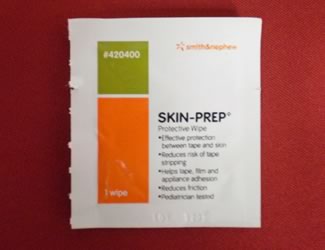
|
Skin Prep
- A product that creates a barrier between your skin and the adhesive on you bandage.
|

|
Spandage
- A soft stockinette to hold the tubing in place.
|

|
AquaGuard
- To protect your line in the shower or bath.
|






























